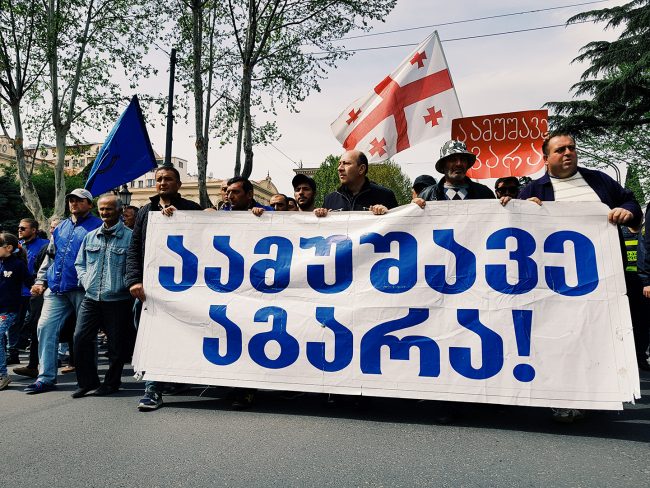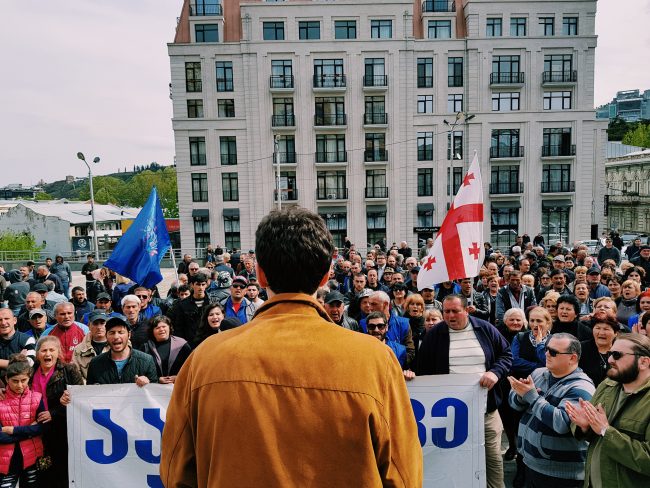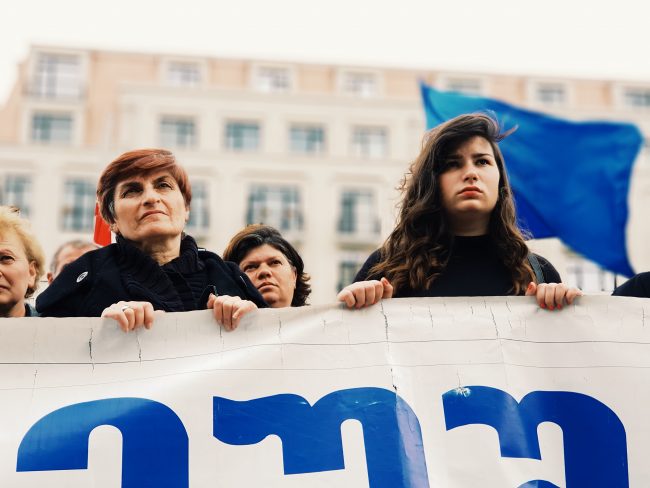

 A sugar factory in Agara, a town west of Tbilisi, is set to reopen after dozens of workers marched 110 kilometres to Tbilisi in protest its closure. An agreement to renovate the factory and reopen it on 1 June was announced on Wednesday, several days after the march.
A sugar factory in Agara, a town west of Tbilisi, is set to reopen after dozens of workers marched 110 kilometres to Tbilisi in protest its closure. An agreement to renovate the factory and reopen it on 1 June was announced on Wednesday, several days after the march.
According to the workers, the factory is the only source of income in Agara as it is the only employer in town. They had previously been demonstrating outside the factory for over a month demanding the government save it.
The factory suspended operations in November, with the company claiming their sugar was no longer competitive amidst growing imports from Europe. After the worker’s arrived in Tbilisi on 20 April, the government pledged to step in.
On Wednesday, the Georgian Trade Unions Confederation (GTUC) announced that negotiations between the factory’s management, the trade unions, and the Business Ombudsman, and led to a deal to renovate the factory.
‘By agreement, renovations will start on 1 May. Those who will be employed to do the renovations will be paid fully. For the others, before the factory launches to its full capacity, which might take a month, they will be paid half a month’s salary in advance’, the GTUC said.
They also said that by the end of the year, the factory’s owners should present a long-term plan on how it will be brought to full capacity.
In a joint statement, the Agara Sugar Company and the business ombudsman said that everybody who was employed at the factory when it suspended operations would be rehired and will be paid from 1 May.
One former factory worker, Zaza Alborishvili, told OC Media the deal meant salvation for the workers. He said he was satisfied with the results of the negotiations for now, but that a long-term strategy needed to be elaborated. He said that up to 120–130 people will be employed on the renovation work.
‘[As for the rest], being paid in advance will be a salvation because they are in such a poor state. This will be a big asset. This is the maxim we were able to do for now’, Alborishvili told OC Media.


Dozens gathered outside the Chancellery in Tbilisi on Friday at a demonstration in support of the workers, including rights activists and trade union employees. ‘Revive Agara’ demonstrators chanted, demanding officials tell them ‘how to survive’.
‘We’ve spent six harsh months together. These were bitter times of unemployment. We have stood for two months [protesting] in front of the factory. I often get asked how did we survive, and I answer — by standing together. The government should tell us how to support our families. We’ve had coworkers who were paid as little as ₾180, and meanwhile, the government is discussing whether they should have white cars instead of black ones’, one factory worker told OC Media at the demonstration.
‘Growing imports’
The factory’s administration had blamed the suspension of activities on the authorities’ decision to lift a quota on white sugar imports, leading to growing imports from Europe.
‘Growing distribution of white sugar globally resulted in a reduction in prices. Our sugar wasn’t able to compete against imported sugar because unlike the prices, material costs have not dropped and production prices have remained the same for the factory’, a statement from the Agara Sugar Company issued on 19 April said.
Workers had for 48 days been demanding the government step in to reopen the factory. After struggling to get attention from officials, they said they decided to march from Agara to Tbilisi by foot.
Photos posted on Facebook showed one of the marchers with blisters on his feet, and ambulances were called several times during the march.
‘The people of Agara have been doomed to famine due to the economic and social reality we live in. It’s a shame when foreign products are so strong on the market that a local factory has to close down. Most importantly, nobody has answered these people and told them how they should survive, there has been zero communication’, the head of the Georgian Trade Union Confederation, Irakli Petriashvili told demonstrators.
‘A long-term plan’
Lina Gvinianidze, a lawyer from the Human Rights Education and Monitoring Centre (EMC) told OC Media that the government should have a plan for the ‘social crisis’ taking place in Agara. She said officials have to come up with both a short-term and long-term plan.
‘A short-term plan could be the reopening of the factory. As for the long-term plan, it should concern not only Agara but all the other places where there is only one employer. The government has no plan for developing such towns’, Gvinianidze said.
She said it was not clear whether the crisis in Agara was caused by the government lifting quotas on imports.
‘This has not been confirmed as a fact yet. There has been no discussion regarding the economic factors, imports, or production profitability, making it hard to say whether this is the cause of the crisis. And if it is, the government should be ready to act because it is authorised to make regulations’, Gvinianidze told OC Media.







